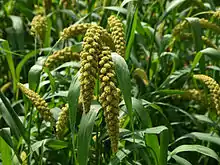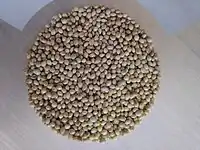panic
English
Pronunciation
- (Received Pronunciation, General American) IPA(key): /ˈpænɪk/
Audio (GA) (file) - Rhymes: -ænɪk
- Hyphenation: pan‧ic
Etymology 1
The adjective is borrowed from Middle French panique (“panicked; pertaining to the Greek god Pan”) (modern French panique) + English -ic (suffix forming adjectives meaning ‘of or pertaining to’). Panique is derived from Ancient Greek πανικός (panikós, “pertaining to Pan; of fear: baseless”) and its neuter singular πανικόν (panikón, “a panic”);[1] and πανικός (panikós) from Πάν (Pán, “the Greek god Pan”) (the god of fields and woods who was believed to be the source of mysterious sounds that caused contagious, groundless fear in herds and crowds, or in people in lonely spots; perhaps ultimately from Proto-Indo-European *peh₂- (“to shepherd; to protect”)) + -ῐκός (-ikós, suffix forming adjectives meaning ‘of or pertaining to’). Adjective sense 3 (“pertaining to or resulting from overpowering fear or fright”) is partly an attributive use of the noun.[1]
The noun is derived from the adjective, while the verb is derived from the noun. Verb sense 1.3 (“to highly amuse, entertain, or impress (an audience watching a performance or show”) is derived from noun sense 4 (“a highly amusing or entertaining performer, performance, or show”).[2]
Adjective
panic (comparative more panic, superlative most panic)
- (Greek mythology, archaic) Alternative letter-case form of Panic (“pertaining to the Greek god Pan”)
- Synonyms: Pandean, (obsolete) panical
- (by extension (see the etymology))
- Of fear, fright, etc: overwhelming or sudden.
- Synonym: (obsolete) panical
- 1603, Michel de Montaigne, “Of Feare”, in John Florio, transl., The Essayes […], book I, London: […] Val[entine] Simmes for Edward Blount […], OCLC 946730821, page 28:
- All things were there in a diſordered confuſion, and in a confuſed furie, vntill ſuch time as by prayers and ſacrifices they had appeaſed the vvrath of their Gods. They call it to this day, the P[a]nike terror.
- 1603, Plutarch, “The Apophthegmes or Notable Sayings of Kings, Princes and Great Captains”, in Philemon Holland, transl., The Philosophie, Commonlie Called, The Morals […], London: […] Arnold Hatfield, OCLC 1051546006, page 425:
- So long as Epaminondas vvas captaine general of the Thebans, there vvas never ſeene in his campe any of theſe ſudden fooliſh frights, vvithout any certeine cauſe, vvhich they call Panique Terrores.
- 1647, Theodore de la Guard [pseudonym; Nathaniel Ward], The Simple Cobler of Aggawam in America. […], London: […] J[ohn] D[ever] & R[obert] I[bbitson] for Stephen Bowtell, […], OCLC 560031272, page 11:
- But vvhy dvvell J ſo intolerable long about Tolerations, J hope my feares are but panick, againſt vvhich I have a double cordiall.
- 1677, Tho[mas] Herbert, Some Yeares Travels into Divers Parts of Africa, and Asia the Great. […], 4th edition, London: […] R. Everingham, for R. Scot, T. Basset, J[ohn] Wright, and R. Chiswell, OCLC 1203359825, page 81:
- [L]ike a couragious Captain does all he can to imbody his Army; he perſvvades, threats, oppoſes, and cries aloud, that albeit Bickermanſe vvas ſlain yet He vvas living; yea that many as good Officers as Bickermanſe vvere in the Army; But in vain; for ſuch vvas their diſorder and pannick fear, that impoſſible it vvas to revoke them: […]
- 1700, [John] Dryden, “The Twelfth Book of Ovid his Metamorphoses, Wholly Translated”, in Fables Ancient and Modern; […], London: […] Jacob Tonson, […], OCLC 228732415, page 422:
- Suſpicion, vvith Sedition join'd, are near; / And Rumors rais'd, and Murmurs mix'd, and Panique Fear.
- 1978, Lawrence Durrell, “Lord Galen’s Farewell”, in Livia: Or Buried Alive […] (The Avignon Quintet; 2), London; Boston, Mass.: Faber and Faber, →ISBN, page 239:
- At that moment a flight of birds passed close overhead, and at the whirr of their wings a panic fear seized her.
- 1993, Ovid, “Book Two”, in James Michie, transl., The Art of Love, paperback edition, New York, N.Y.: The Modern Library, published 2002, →ISBN:
- Terrified, he looked down from the skies / At the waves, and panic blackness filled his eyes.
- Pertaining to or resulting from overwhelming fear or fright.
- 1642, Thomas Fuller, “The Life of Gustavus Adolphus King of Sweden”, in The Holy State, Cambridge, Cambridgeshire: […] Roger Daniel for John Williams, […], OCLC 1238111360, book IV, paragraph 5, page 332:
- [H]e perceived hovv that many vvomen follovved his ſouldiers, ſome being their vvives, and ſome vvanting nothing to make them ſo but marriage, […] The King coming to a great river, after his men and the vvagons vvere paſſed over, cauſed the bridge to be broken dovvn, hoping ſo to be rid of theſe feminine impediments; but they on a ſudden liſt up a panick ſhrick vvhich pierced the skies, and the ſouldiers hearts on the other ſide of the river, vvho inſtantly vovved not to ſtirre a foot farther, except vvith baggage, and that the vvomen might be fetch'd over, vvhich vvas done accordingly.
- 1705, [Daniel Defoe], The D[utch] Deputies. A Satyr, London: [s.n.], OCLC 39737817, page 5:
- No Dangers threatned, but they ſmil'd to meet / The pannick French-men trembling at their Feet.
-
- Of fear, fright, etc: overwhelming or sudden.
Alternative forms
- panick (obsolete)
Derived terms
- panical (obsolete)
Translations
|
Noun
panic (countable and uncountable, plural panics)
- (uncountable) Overwhelming fear or fright, often affecting groups of people or animals; (countable) an instance of this; a fright, a scare.
- 1914, Louis Joseph Vance, “Burglary”, in Nobody, New York, N.Y.: George H[enry] Doran Company, published 1915, OCLC 40817384, page 35:
- She wakened in sharp panic, bewildered by the grotesquerie of some half-remembered dream in contrast with the harshness of inclement fact, drowsily realising that since she had fallen asleep it had come on to rain smartly out of a shrouded sky.
- 1925, F[rancis] Scott Fitzgerald, chapter VII, in The Great Gatsby, New York, N.Y.: Charles Scribner’s Sons, OCLC 884653065; republished New York, N.Y.: Charles Scribner’s Sons, 1953, →ISBN, page 125:
- There is no confusion like the confusion of a simple mind, and as we drove away Tom was feeling the hot whips of panic. His wife and his mistress, until an hour ago secure and inviolate, were slipping precipitately from his control.
- 1963, Margery Allingham, “Meeting Point”, in The China Governess: A Mystery, London: Chatto & Windus, OCLC 483591931, page 232:
- Meanwhile Nanny Broome was recovering from her initial panic and seemed anxious to make up for any kudos she might have lost, by exerting her personality to the utmost. She took the policeman's helmet and placed it on a chair, and unfolded his tunic to shake it and fold it up again for him.
- 1986, "Weird Al" Yankovic (lyrics and music), “Christmas at Ground Zero”, in Polka Party!:
- It's Christmas at ground zero / There's panic in the crowd / We can dodge debris / While we trim the tree / Underneath a mushroom cloud
- 1994, Stephen Fry, chapter 2, in The Hippopotamus, New York, N.Y.: Soho Press, →ISBN, page 33:
- With a bolt of fright he remembered that there was no bathroom in the Hobhouse Room. He leapt along the corridor in a panic, stopping by the long-case clock at the end where he flattened himself against the wall.
-
- (countable, computing) Short for kernel panic (“on Unix-derived operating systems: an action taken by the operating system when it cannot recover from a fatal error”); (by extension) any computer system crash.
- 2010, Solaris system engineers, “Managing Devices”, in Solaris 10 System Administration Essentials (Solaris System Administration Series), Santa Clara, Calif.: Sun Microsystems Press, →ISBN, section 9.3.4.2 (Avoiding Recurring Panic):
- If your new driver has an error that panics the system when you load the driver, then the system will panic again when it tries to reboot after the panic. The system will continue the cycle of panic, reboot, and panic as it attempts to reload the faulty driver every time it reboots after panic.
-
- (countable, economics, finance) A rapid reduction in asset prices due to broad efforts to raise cash in anticipation of such prices continuing to decline.
- 1925, F[rancis] Scott Fitzgerald, chapter V, in The Great Gatsby, New York, N.Y.: Charles Scribner’s Sons, OCLC 884653065; republished New York, N.Y.: Charles Scribner’s Sons, 1953, →ISBN, page 91:
- "I thought you inherited your money." / "I did, old sport," he said automatically, "but I lost most of it in the big panic—the panic of the war."
- 2008 July 11, Romaine Bostick, “Fannie Mae, Freddie Mac are Sound; Panic Unwarranted, Dodd Says”, in Bloomberg News:
- "There is sort of a panic going on, and that is not what ought to be," [Chris] Dodd, a Democrat from Connecticut, said at a press conference in Washington today. "Fannie Mae and Freddie Mac were never bottom feeders in the residential mortgage market."
-
- (countable, US, originally theater, colloquial) A highly amusing or entertaining performer, performance, or show; a riot, a scream.
Derived terms
- antipanic
- gay panic
- gay panic defense
- Hispanic panic
- homosexual panic defense
- kernel panic
- moral panic
- panic attack
- panic button
- panic disorder
- panicful
- panicky
- panicless
- paniclike
- panicmonger
- panicmongering
- panicogenesis
- panicogenic
- panic rev
- panic room
- panic snap
- panic stations
- panic-stricken
- panic-strike
- panic-struck
- press the panic button
- satanic panic
- trans panic
Translations
|
Verb
panic (third-person singular simple present panics, present participle panicking, simple past and past participle panicked)
- (transitive)
- To cause (someone) to feel panic (“overwhelming fear or fright”); also, to frighten (someone) into acting hastily.
- 1927 October, Rudyard Kipling, “Fairy-Kist”, in Limits and Renewals, Dominions edition, London: Macmillan and Co., […], published 1932, OCLC 471758261, page 169:
- He told us he'd almost stepped on Ellen's body that night—dead and stiffening. Then I'd come round the corner and hailed him, and that panicked him.
-
- (computing) To cause (a computer system) to crash.
- 2010, Solaris system engineers, “Managing Devices”, in Solaris 10 System Administration Essentials (Solaris System Administration Series), Santa Clara, Calif.: Sun Microsystems Press, →ISBN, section 9.3.4.2 (Avoiding Recurring Panic):
- If your new driver has an error that panics the system when you load the driver, then the system will panic again when it tries to reboot after the panic. The system will continue the cycle of panic, reboot, and panic as it attempts to reload the faulty driver every time it reboots after panic.
-
- (US, colloquial) To highly amuse, entertain, or impress (an audience watching a performance or show).
- To cause (someone) to feel panic (“overwhelming fear or fright”); also, to frighten (someone) into acting hastily.
- (intransitive)
- To feel panic, or overwhelming fear or fright; to freak out, to lose one's head.
- 2019 January 25, Our House is on Fire, Davos, Graubünden, Switzerland: World Economic Forum, spoken by Greta Thunberg, 5:22 from the start:
- I don't want you to be hopeful, I want you to panic. I want you to feel the fear I feel every day and then I want you to act.
-
- (computing) Of a computer system: to crash.
- To feel panic, or overwhelming fear or fright; to freak out, to lose one's head.
Derived terms
- panic-buy
- panic-buyer
- panic buying
- panicked (adjective)
- panicker
- panicking (adjective, noun)
- panickingly (rare)
- panic-sell
- panic selling
Translations
|
Etymology 2



From Late Middle English panik, panyk (“plant of the genus Panicum”),[3] borrowed from Latin pānicum, pānīcum (“foxtail millet or Italian millet (Setaria italica); plant of the genus Panicum, panicgrass”); further etymology uncertain, probably either from pānis (“bread; loaf”) (possibly ultimately from Proto-Indo-European *peh₂- (“to graze; to protect; to shepherd”)) or pānus (“ear of millet; thread wound on a bobbin”) (ultimately from Proto-Indo-European *(s)penh₁- (“to twist; to weave”)) + -cum (suffix forming neuter nouns).[4]
Noun
panic (countable and uncountable, plural panics)
- (originally) Foxtail millet or Italian millet (Setaria italica), the second-most widely grown species of millet.
- (by extension) A plant of the genus Panicum, or of similar plants of other genera (especially Echinochloa and Setaria) formerly included within Panicum; panicgrass or panic grass.
- 1562, Wylliam Turner [i.e., William Turner], “Of Panick”, in The Second Parte of Guilliam Turners Herball⸝ […], Cologne: […] Arnold Birckman, OCLC 1157385678, folios 76, recto – 76, verso:
- [folio 76, recto] Panicum […] hathe no name in Engliſh yet⸝ but it may well be called panick after yͤ Latin. Panik hath leues lyke vnto a rede when it commeth firſt furth. […] [folio 76, verso] Dioſcorides writeth yͭ Panic hathe the ſame vertue yͭ Milleth hathe⸝ but that it noriſheth & byndeth leſſe. Galene ſayeth yͭ panic is of the kynde of pulſes⸝ and in lykenes lyke vnto millet⸝ and alſo in vertue of ſmall noriſhmẽt⸝ and dry.
- Panicum […] hath no name in English yet, but it may well be called panic after the Latin. Panic hath leaves like unto a reed when it cometh first forth. […] [Pedanius] Dioscorides writeth that panic hath the same virtue that millet hath, but that it nourisheth and bindeth less. Galen sayeth that panic is of the kind of pulses, and in likeness like unto millet, and also in virtue of small nourishment, and dry.
- 1597, John Gerarde [i.e., John Gerard], “Of Panick”, in The Herball or Generall Historie of Plantes. […], London: […] Edm[und] Bollifant, for Bonham and Iohn Norton, OCLC 1184595079, book I, page 78:
- There be ſundrie ſorts of Panick, although of the ancients there hathe beene ſet downe but two, that is to ſay, the wilde or fielde Panick, and the garden or manured Panick: […]
-
- The edible grain obtained from one of the above plants.
- 1597, John Gerarde [i.e., John Gerard], “Of Panick”, in The Herball or Generall Historie of Plantes. […], London: […] Edm[und] Bollifant, for Bonham and Iohn Norton, OCLC 1184595079, book I, page 79:
- Pannick ſtoppeth the laske as Millet doth, being boiled (as Plinie reporteth) in Goates milk and drunke twiſe in a day. Bread made of Pannick nouriſheth little, and is cold and dry, verie brittle, hauing in it neither clammineſſe, nor fatneſſe; and therefore it drieth a moiſt belly.
-
Alternative forms
- panick (obsolete)
Derived terms
- hairy panic
- panicgrass, panic grass
Related terms
- panicum
- Panicum
Translations
References
- “panic, adj. and n.2”, in OED Online
 , Oxford, Oxfordshire: Oxford University Press, June 2021; “panic1, n.”, in Lexico, Dictionary.com; Oxford University Press, 2019–2022.
, Oxford, Oxfordshire: Oxford University Press, June 2021; “panic1, n.”, in Lexico, Dictionary.com; Oxford University Press, 2019–2022. - “panic, v.”, in OED Online
 , Oxford, Oxfordshire: Oxford University Press, March 2021; “panic1, v.”, in Lexico, Dictionary.com; Oxford University Press, 2019–2022.
, Oxford, Oxfordshire: Oxford University Press, March 2021; “panic1, v.”, in Lexico, Dictionary.com; Oxford University Press, 2019–2022. - “pānik, n.”, in MED Online, Ann Arbor, Mich.: University of Michigan, 2007.
- Compare “panic, n.1”, in OED Online
 , Oxford, Oxfordshire: Oxford University Press, December 2020; “panic2, n.”, in Lexico, Dictionary.com; Oxford University Press, 2019–2022.
, Oxford, Oxfordshire: Oxford University Press, December 2020; “panic2, n.”, in Lexico, Dictionary.com; Oxford University Press, 2019–2022.
Further reading
 panic on Wikipedia.Wikipedia
panic on Wikipedia.Wikipedia  kernel panic on Wikipedia.Wikipedia
kernel panic on Wikipedia.Wikipedia  panic (disambiguation) on Wikipedia.Wikipedia
panic (disambiguation) on Wikipedia.Wikipedia  foxtail millet on Wikipedia.Wikipedia
foxtail millet on Wikipedia.Wikipedia  Setaria italica on Wikimedia Commons.Wikimedia Commons
Setaria italica on Wikimedia Commons.Wikimedia Commons  Setaria italica on Wikispecies.Wikispecies
Setaria italica on Wikispecies.Wikispecies
 Panicum on Wikipedia.Wikipedia
Panicum on Wikipedia.Wikipedia  Panicum on Wikimedia Commons.Wikimedia Commons
Panicum on Wikimedia Commons.Wikimedia Commons  Panicum on Wikispecies.Wikispecies
Panicum on Wikispecies.Wikispecies
Anagrams
- cap'in, incap
Czech
Pronunciation
- IPA(key): [ˈpaɲɪt͡s]
- Hyphenation: pa‧nic
Noun
panic m anim (feminine panna)
- male virgin
Declension
| singular | plural | |
|---|---|---|
| nominative | panic | panicové, panici |
| genitive | panice | paniců |
| dative | panicovi, panici | panicům |
| accusative | panice | panice |
| vocative | panici | panicové, panici |
| locative | panicovi, panici | panicích |
| instrumental | panicem | panici |
Related terms
- panna f
- pán m
- paní f
Further reading
- panic in Příruční slovník jazyka českého, 1935–1957
- panic in Slovník spisovného jazyka českého, 1960–1971, 1989
- panic in Internetová jazyková příručka
French
Etymology
Borrowed from Latin panicum.
Pronunciation
- IPA(key): /pa.nik/
Noun
panic m (plural panics)
- (botany) Refers to several thorny shrubs; cockspur, panic, panicgrass
- Synonyms: pied-de-coq, patte de poule, crête de coq
Slovak
Pronunciation
- IPA(key): /ˈpaɲit͡s/
Noun
panic m (genitive singular panica, nominative plural panici, genitive plural panicov, declension pattern of chlap)
- male virgin
Declension
| singular | plural | |
|---|---|---|
| nominative | panic | panici |
| genitive | panica | panicov |
| dative | panicovi | panicom |
| accusative | panica | panicov |
| locative | panicovi | panicoch |
| instrumental | panicom | panicmi |
Derived terms
- panický
- panicky
- panickosť, panictvo
Related terms
- panna f
Further reading
- panic in Slovak dictionaries at slovnik.juls.savba.sk